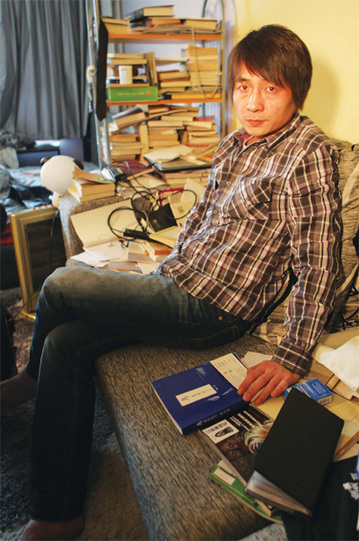CSI, with a twist
Updated: 2011-03-25 10:38
By Chitralekha Basu and Yang Guang (China Daily European Weekly)
'A writer of crime stories' who knows too well what it means to be caught in the throes of change and hostility
A Yi's pad in one of the thick-knit cheerless building blocks in Puhuangyu, in southern Beijing, looks just the sort some of the characters of his stories could be living in. The mattress tilts to one side of the bed, its red cover showing from underneath a crumpled sheet; books toppled down from the rack, lie on top of each other on the couch, which, with a laptop mounted on a flimsy tea table, also doubles as A Yi's workstation.
 |
|
A Yi believes why-dunit is the soul of a crime story. |
Empty cigarette cartons, polystyrene cups and discarded socks - turned inside out and bunched up into uneven balls - lie scattered on the gray rug, camouflaging piles of cigarette ash.
There is a deep sense of hurt in this room, screaming silently at the unsparing nature of life. And A Yi (originally named Ai Guozhu), who joined the police force immediately after graduating from school, would know something about how a hostile and ruthless society can bring out extreme reactions in human beings.
He prefers to call himself "a writer of stories about crime", rather than a "crime thriller writer". The sleuthing, or the nabbing of a criminal at the end of a successful investigation, is not that important in his books. He is more interested in the so-called criminal's mind, treating it with informed empathy.
"Most crimes are an accident," says A Yi. "Nobody commits a crime because he sees it as an ideal solution." It is these accidental criminals who are central to almost all his stories: compiled in two collections (Gray Stories, 2008 and Birds Saw Me, 2010).
Unlike the Western style whodunit, A Yi is interested in the why-dunit. "Crime is only a shell," he says. "A crime scene sharpens the characters and dramatizes the story. Sometimes, a solved case helps unravel the complexity of human nature, at other times, it might complicate it further."
The murderers and burglars in A Yi's stories are creatures of circumstance. Like the existentialist protagonists in the novels by Franz Kafka, Albert Camus and the somewhat brazenly amoral and idiosyncratic characters in the Czech writer Milan Kundera's novels - the writers A Yi admires the most - the people in his books are unable to cope with the stress in a society that is moving ahead at breakneck speed.
"Some people are getting left behind in this fast-changing society. Some accept the changes, tacitly or otherwise, some remain silent and some take to crime," he says.
In his forthcoming novel Cat and Mouse, due in August, a bored and isolated young man with no apparent goals in life kills a female classmate and stuffs her body in the refrigerator. It's when the police are hot on his trail that he gets the much sought-after adrenalin rush. Murder is the only way he could get noticed, and he is kicked by the idea that he finally is.
A Yi's journey, from a small village, Ruichang, in East China's Jiangxi province, to an apartment in Beijing and a job as executive editor with the soon-to-be-launched Chinese-English literary magazine Chutzpah still intrigues him. He always wanted to get away from the life of being "a frog in a village well" where the youth just sit back and play mahjong all day, and worked his way to the Chinese capital, but did not expect it to happen quite so soon.
"I began writing (systematically) at 32 and now I'm 35. It feels strange recounting my writing life," A Yi says.
He never felt at home, either in the police academy or in the administrative job to which he was subsequently promoted. His parents - he still remembers being spanked by his pharmacy-manager dad for failing to memorize an entire book of Tang poems in a year - could never quite figure out why he would want to give up a public servant's job, but A Yi managed to deal with the resistance. He hopped, skipped and jumped across jobs and landed up in Beijing, via Zhengzhou in Central China's Henan province, six years ago.
Even as he tried his hand at editing jobs with newspapers and blogged for a while and got tired soon after, A Yi would "send hundreds of stories to different publications and hardly ever get an answer".
Fortune smiled on him when Luo Yonghao, founder of the website bullogger.com, to which he contributed, recommended him to publishers, leading to the publication of Gray Stories. Soon after, his short fiction was picked by the influential People's Literature magazine and five of them made it to Today, a quarterly literary magazine edited by the redoubtable poet and academic Bei Dao. A Yi knew he had arrived.
Now that he has a perspective on life in small towns of China, having left Ruichang nine years ago, A Yi recognizes the sense of desperation and helplessness in the eyes of migrants struggling to make a life in Beijing. He finds the tension between small-town aspirations and the lure of the city quite engaging and obviously relatable. He is planning to write a non-fiction piece based on the life of an idealistic and upright, somewhat scholarly, colleague in the police force, who forever wanted to get away from it all but never managed to step out of his county.
As it happens in typical whodunits, there is indeed a woman in the background, who, like a catalyst, accelerated the pace of A Yi's coming into his own. The girl he loved and pursued for eight years never returned his love, indirectly pushing him to leave his hometown and make a life.
Evidently, A Yi has a reference point for the deep sense of failure, alienation and anguish that marks some of his characters. He has suffered, but thankfully never reached the tipping point. He had to stop writing the scene of gruesome murder in Cat and Mouse, at times, throw up and come back to it after a while. "I promised myself that I wasn't going there again."
Still single after a string of failed relationships, he cannot wish away the memory of the unrequited love that has "grown like an organ of my body". A Yi, in fact, is a pen name, a code in which the name of the lady who spurned his love is encrypted.
"From a hopeful young man, it's turned me into a gray man," he says.
But he's found a promising writing career in the bargain, and a better grip on life. Today A Yi is better reconciled with the idea that pain and disorder are part of the human experience, and that "happiness and pain are not mutually exclusive".
Earlier, he would think of bringing in "the lighter, happier, funnier and warmer" elements into his writing once he reached 40.
"But now I think I might as well do it now."
E-paper

Green mission
Tony blair believes China will take a leading role to fight climate change and cut emissions.
Stepping on to success
French connection
Generation gaps
Specials

Have you any wool?
The new stars of Chinese animation are edging out old childhood icons like Mickey Mouse and Hello Kitty.

Fill dad's shoes
Daughter and son are beginning to take over the family business of making shoes.

Virtual memorial
High-Tech touches to traditional tombsweeping festival help environment.
